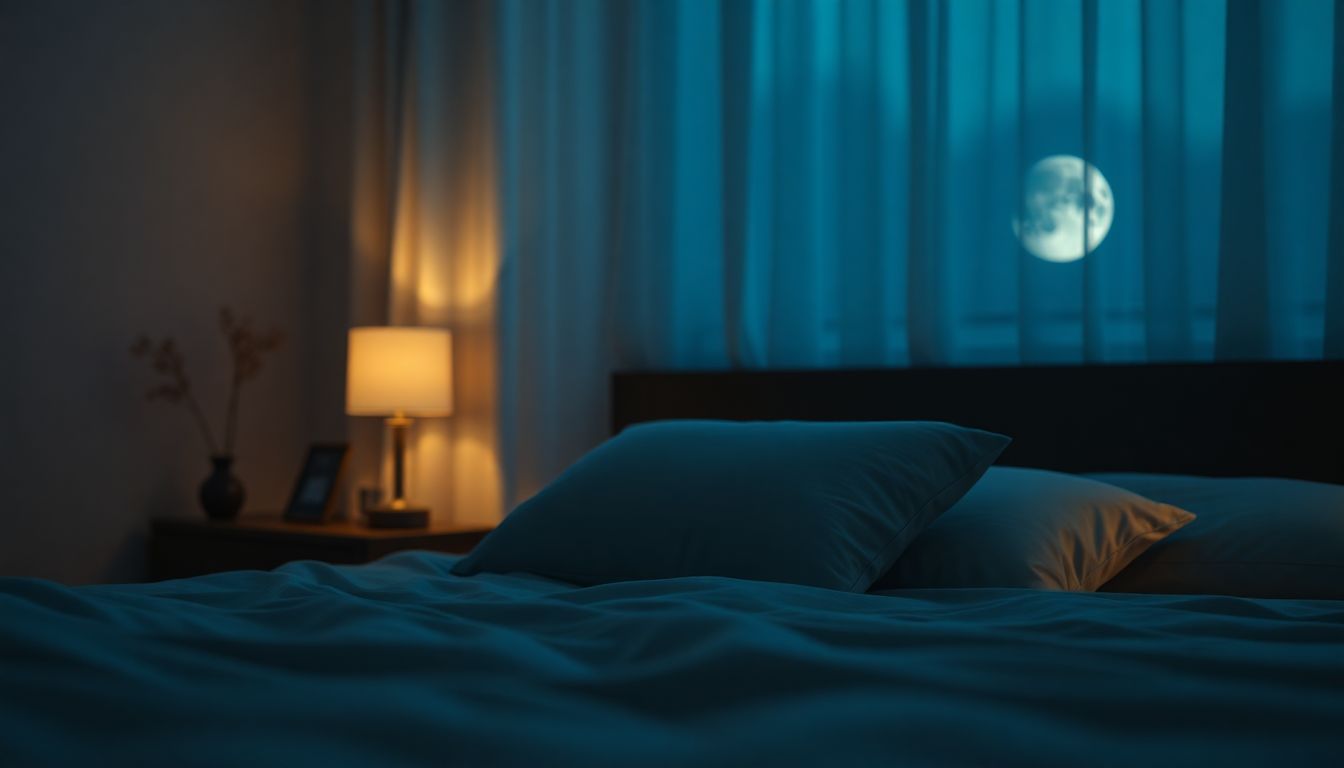Why Deep Sleep is Your Body’s Reset Button
We often focus simply on the amount of sleep we get, but the quality of that sleep—specifically the time spent in deep sleep—is what truly matters for mental and physical health. Deep, restorative sleep is when your body repairs tissue, your immune system recharges, and your memories are consolidated. Without it, even eight hours in bed can leave you feeling sluggish. This comprehensive guide provides the best deep sleep tips and strategies to help you unlock the most powerful stage of your sleep cycle.
This guide is part of our Sleep Resource Center, which covers sleep science, supplements, routines, and environmental optimization.
Section 1: Understanding the Foundation of Quality Sleep
To achieve high-quality rest, you first need to understand the mechanics behind it. This section breaks down the biology of your sleep, addressing the keyword sleep cycles explained.
A. The Four Stages: REM and NREM
Sleep is not a single state; it is a complex cycle divided into Non-Rapid Eye Movement (NREM) and Rapid Eye Movement (REM) phases. The first three stages are NREM, culminating in deep sleep (N3).
- NREM Stage 1 & 2: Light sleep, preparing you for deeper rest.
- NREM Stage 3 (Deep Sleep): The restorative phase critical for physical recovery and growth.
- REM Sleep: The dream stage essential for cognitive function, learning, and mood regulation.
Read More: For a detailed breakdown of how each phase impacts your daytime performance, see: Understanding REM and NREM: How Sleep Cycles Impact Your Health.
B. The Circadian Rhythm: Your Internal Clock
Your ability to know the best time to sleep is governed by your circadian rhythm—a 24-hour cycle that regulates feelings of wakefulness and drowsiness. The master regulator of this clock is the hormone melatonin. Keeping this rhythm consistent is foundational to a good night’s rest.
Read More: Learn how to optimize your body’s natural sleep signals with: The Role of Melatonin in Regulating Your Circadian Rhythm.
Section 2: Building the Perfect Sleep Environment (The Comfort Factors)
Your bedroom should be a sanctuary optimized for rest. Addressing environmental factors is one of the most effective how to sleep better strategies.
A. Temperature, Darkness, and Sound
The ideal sleep environment is cool, dark, and quiet. A drop in core body temperature signals to your brain that it’s time to sleep. Excessive light (especially blue light) and inconsistent noise can interrupt your sleep cycles.
Read More: Transform your room into a sleep sanctuary by following: Optimizing Your Sleep Environment: The Ultimate Bedroom Guide.
B. Physical Support: Mattress and Pillow
The right support for your body is paramount to avoiding sleep disruptions from pain or discomfort. Your pillow, in particular, must align with your preferred sleep position (side, back, or stomach) to maintain proper neck and spine alignment.
Read More: Ensure you are supported all night long: The Best Pillow for Every Sleep Position: Back, Side, and Stomach and How to Choose a Mattress: Finding Your Perfect Firmness and Type.
C. Addressing Sleep Disruptions
Snoring can be a major disruptor, not just for partners but for the snorer themselves. Understanding its cause is the first step toward finding relief.
Read More: Explore solutions for a quieter, more restful night: Stop the Racket: Non-Invasive Anti-Snore Devices That Actually Work.
Section 3: The Mind-Body Connection (Diet and Routine)
Achieving deep sleep requires preparation, starting with what you consume and how you wind down.
A. Nutritional Support for Sleep
What you eat can significantly influence your sleep quality. Certain vitamins and minerals, like magnesium and zinc, are co-factors in the production of sleep-regulating hormones. Similarly, incorporating the right foods and beverages can prepare your body for rest.
Read More: Boost your internal resources with: Essential Vitamins and Minerals for Better Sleep Quality and Dietary Changes: Foods to Eat and Avoid for Better Quality Sleep.
B. The Bedtime Routine
A consistent evening routine signals to your brain that the day is over. This transition should include calming activities like gentle stretching or reading, avoiding screens, and incorporating relaxing herbal tea for sleep.
Read More: Master the crucial hours before bed with: The Ultimate Morning and Evening Routine for Optimal Sleep Health and Yoga and Gentle Stretching for a Relaxing Bedtime Routine.
C. Managing Stress and Anxiety
One of the greatest barriers to falling asleep fast is a racing mind due to stress and anxiety. Developing techniques to soothe your nervous system before bed is essential.
Read More: Learn effective methods for pre-sleep relaxation: Can Anxiety and Stress Ruin Your Sleep? Natural Solutions and Journaling for Better Sleep: A Nightly Habit to Calm Your Racing Mind.
Section 4: Tools and Techniques for Rest
Beyond environment and nutrition, you can actively use sound and psychological tools to encourage deep, restorative rest.
A. Auditory Aids: Sound and Frequency
Tools like white noise and binaural beats for sleep can help quiet the mind and guide brainwave activity toward the slower, deeper Delta frequencies associated with restorative sleep.
Read More: Explore the calming power of sound with: The Science of Binaural Beats: Do They Really Help You Sleep? and Understanding the Power of White Noise, Pink Noise, and Brown Noise.
B. Mindfulness and Meditation
Meditation for sleep is one of the most powerful tools for improving sleep quality. By training your mind to focus and release the day’s worries, you create the psychological stillness necessary for slumber.
Read More: Start your journey to mindful rest: A Beginner’s Guide to Sleep Meditation and Guided Imagery.
Conclusion: Your Path to Restorative Sleep
Achieving deep, restorative sleep is an attainable goal that results from the cumulative effect of small, positive changes across environment, routine, and mindset. By implementing these deep sleep tips and utilizing the resources above, you can significantly improve your overall health and well-being.
Frequently Asked Questions (FAQs)
- 1. What is the difference between regular sleep and “deep, restorative sleep”?
- Answer: “Regular sleep” simply refers to time spent asleep. “Deep, restorative sleep” specifically refers to NREM Stage 3 (N3), where physical healing, cell repair, and memory consolidation occur. It is the most vital stage for feeling truly rested.
- 2. How much deep sleep should an adult aim for each night?
- Answer: Most healthy adults need approximately 1.5 to 2 hours of deep sleep (about 15-25% of total sleep time). This amount naturally declines as we age.
- 3. What are the main signs I am not getting enough deep sleep?
- Answer: Signs include constant daytime fatigue, difficulty concentrating or learning new things, increased irritability, weakened immune system function, and feeling physically sore upon waking.
- 4. Can diet really affect how deep I sleep?
- Answer: Yes. Certain foods and drinks (like caffeine and sugar before bed) can stimulate the nervous system. Conversely, foods rich in magnesium, tryptophan, and B vitamins can support the natural production of sleep hormones.
- 5. Is it better to sleep eight inconsistent hours or six consistent hours?
- Answer: Consistency is generally more valuable than quantity alone. Consistent sleep times help stabilize your circadian rhythm, which makes it easier to fall asleep and achieve predictable sleep cycles, including deep sleep.
- 6. What are binaural beats, and how can they help achieve deep sleep?
- Answer: Binaural beats are an auditory illusion that occurs when two different frequencies are played separately into each ear. When set to the Delta wave frequency (the frequency of deep sleep), they can encourage your brainwaves to match this rhythm, helping you relax into the restorative stage.
- 7. How does stress prevent me from falling into deep sleep?
- Answer: Stress elevates cortisol (the stress hormone). High cortisol keeps your body in a state of alertness, making it difficult for the nervous system to switch into the “rest and digest” mode necessary to enter the deep, slow-wave stages of sleep.
- 8. Should I worry if my sleep tracker shows very little deep sleep?
- Answer: Sleep trackers are estimates, especially for deep sleep. If you feel rested, don’t worry. If you feel tired and your tracker consistently shows low deep sleep, focus on optimizing your routine and environment.
- 9. What is the “best time” to go to bed?
- Answer: The best time is one that allows you to get 7-9 hours and aligns with your natural circadian rhythm. For most people, aiming to be asleep between 10 PM and 12 AM optimizes the timing of deep sleep phases.
- 10. How quickly can I start seeing results from implementing these deep sleep tips?
- Answer: You can see marginal improvements immediately (within 1-3 nights) by implementing small changes like darkness and temperature control. Significant, sustained improvements typically take 2-4 weeks of consistent routine changes.

Revive Your Nights with Sleep Revive
Discover the natural solution to wake up refreshed and energized every morning. Transform your sleep quality starting tonight!









